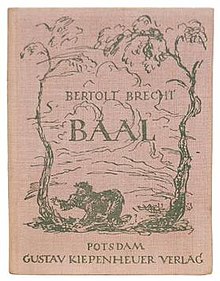Baal (play)
- Baal, poet
- Ekart, composer, friend of Baal
- Mech publisher and wholesale merchant
- Emilie, Mechs woman
- Dr. Piller, critics
- Johanna, Johannes friend
- Louise, waitress
- John Schmidt, Baal - disciple
- The two sisters
Baal is a drama by Bertolt Brecht. A first version of the twenty -year-old wrote in 1918, a second in 1919, followed by several more versions. Brecht integrated into the piece a number of his early songs and poems, some with close reference to the poems of François Villon. It was premiered on December 8, 1923 after being awarded the Kleist Prize to Brecht in Leipzig's Old Theatre, directed by Alwin Kronacher.
- 3.1 expenditure
- 3.2 musical settings
- 3.3 movie
- 3.4 Further Reading
Action
Baal is a young talented poet and contributes to his patron, the merchant, Mech, at an evening party a poem. Although it towards him enthusiasm and amazement, Baal shows no interest, behaves rudely and is thrown out. Baal said: " What can I help it if your wine, you give me makes me drunk ' Mechs woman is Baal's lover, he treated them raw, it forces eg in a brandy tavern to kiss a coachman. He sleeps with Johanna, the much younger girlfriend of his admirer, John; these lunges as he does nothing further from her, desperate in a stream.
Baal impregnates Sophie Dechant, which he initially well- loved, but then quickly sees as load and " assign " his friend Ekart wants. Baal: "What must I give to you, that you take my wife?" In the spring, he disappears with Ekart and the two pull cheating, by country. Eight years later, Baal Ekart stabs in the dispute and eventually dies at loggers, to which he had taken refuge. The drama ends with the sentence of a lumberjack, who reports from the last words of Baal: "I am listening more to the Rain".
Epic structural elements
Baal was long before Brecht's concept of epic theater. Individual elements in the Baal but have been in the direction of his later theatrical theory. For example, the beginning and end of the piece are each held open borders and thus of the Aristotelian theory from. Brecht wanted to distance themselves with the sensuality and ' worldliness ' of Baal and the pathos of Expressionism.
Demarcation from Expressionism
Baal was created in 1918 from a counter-position to the expressionist drama The Lonely. A human downfall of Hanns Johst. There fails a poet in society because he is mentally this far ahead, and ends in solitude. Baal should be the radical opposite of Johst dramas shape Grabbe. Brecht shows a man who is committed to vitalism. A perfect turn to nature has a turning away from the people the result. And so at the expense of society.
Brecht dismantled so that the expressionist pathos that will restore the people in the natural state by leading vitalism absurdity. Expressionism can be understood as an inspiration point for the emergence of Baal. At the same time Brecht expressionist style means operated.
Demarcation from the Aristotelian theory
Brecht calls for a antiillusionäres theater. For the spectators were prevented by the illusion on independent thinking. The goal was a piece with which the viewer can not identify. In his diary he wrote: " A large artistic error I hope to have avoided Baal and thicket: entrain their effort. [ ... ] "
Baal and the theory of epic theater
The later theory of epic theater was built in 1930 and thus after the emergence of the first version of Baal. A final version of the theory never existed. There exist in the Baal but already many elements of epic theater as the alienation effect.
An important element of this alienation are interspersed songs and poems in Baal. Already the input poem The Choral from the great Baal is a part of this effect. More epic elements in Baal:
- Incorporation of various genres,
- Identity resolutions,
- Stage directions and ancillary text,
- Figures as narrator,
- Inconsistencies in the plot,
- Contradictions in the time sequence,
- Conflicting dialogues,
- Open entry,
- Open end.
Nevertheless, the debut drama Baal can be no talk of a piece of epic theater. To this end, the integration of the representation of company processes is missing. The factor of history emerges only in abstract form in Baal. While this suggests a certain Episierung of the drama, but lacks the typical dialectic, which is typical of all later works of Brecht. A Episierung takes place in the mold, but not the contents here.










